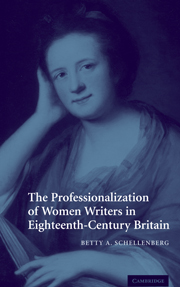Book contents
- Frontmatter
- Contents
- Acknowledgments
- A note on citations
- Introduction: “building on public approbation”
- 1 Frances Sheridan, John Home, and public virtue
- 2 The politicized pastoral of Frances Brooke
- 3 Sarah Scott, historian, in the republic of letters
- 4 The (female) literary careers of Sarah Fielding and Charlotte Lennox
- 5 Harmless mediocrity: Edward Kimber and the Minifie sisters
- 6 From propensity to profession in the early career of Frances Burney
- 7 Women writers and “the Great Forgetting”
- Coda
- Notes
- Bibliography
- Index
3 - Sarah Scott, historian, in the republic of letters
Published online by Cambridge University Press: 12 November 2009
- Frontmatter
- Contents
- Acknowledgments
- A note on citations
- Introduction: “building on public approbation”
- 1 Frances Sheridan, John Home, and public virtue
- 2 The politicized pastoral of Frances Brooke
- 3 Sarah Scott, historian, in the republic of letters
- 4 The (female) literary careers of Sarah Fielding and Charlotte Lennox
- 5 Harmless mediocrity: Edward Kimber and the Minifie sisters
- 6 From propensity to profession in the early career of Frances Burney
- 7 Women writers and “the Great Forgetting”
- Coda
- Notes
- Bibliography
- Index
Summary
… to converse with historians is to keep good company: many of them were excellent men, and those who were not such, have taken care however to appear such in their writings.
(Lord Bolingbroke, Letters on the Study and Use of History, 1752)… you make so good use of history it wd be strange not to be glad to furnish you with it.
(Elizabeth Montagu to Sarah Scott, [1759])Although there can be few historians of eighteenth-century British literature who remain unfamiliar with Sarah Robinson Scott, woman novelist and utopian writer, she was in her day something of a recluse, living in genteel poverty in provincial England, and choosing to keep her distance from the glittering and conspicuous salon circle presided over by her bluestocking sister Elizabeth Robinson Montagu, where she might have attained a higher public profile for her wit and intellectual accomplishments. Indeed, Sarah Scott appears to have consciously sought to live out her life in the role of private gentlewoman, called upon to perform quietly the Christian duties of her social station to the extent afforded by her kinship relations, a few long-term friendships, her limited means, and her poor health. To this identity, private in multiple senses, she sucessfully subordinated her activities as published professional author. Thus at the age of seventy she writes to her sister, in the context of the political stresses of the Warren Hastings trial, “If I were to write any thing it must be a Satire on Juries …, it is therefore lucky for me that I am not a Writer.”
- Type
- Chapter
- Information
- Publisher: Cambridge University PressPrint publication year: 2005



